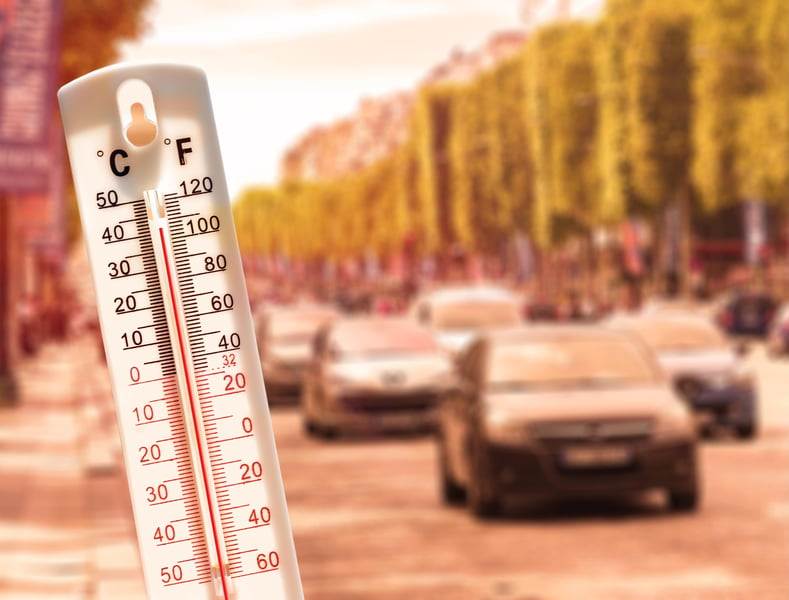Get Healthy!

- By Sydney Murphy HealthDay Reporter
- Posted July 22, 2022
Heatwave Alert: Stay Safe in Searing Temps
As blistering temperatures blanket much of the country, more people are at risk heat exhaustion and potentially fatal heat strokes. One expert offers tips on how to avoid the dangerous effects of record-breaking temperatures.
While anyone can develop heat-related illness from prolonged exposure to excessive heat and/or high humidity, including athletes or those whose job requires them to spend time outside, some people are particularly vulnerable.
Dr. Jed Zeigler, an emergency medicine specialist at Penn State Health Hampden Medical Center in Enola, Pa., explains that people who struggle to control their body temperature are more susceptible to the dangers of extreme heat. Those who have heart failure, kidney failure, poor circulation or high blood pressure are also high-risk, as are infants and very young children.
According to Zeigler, people over 65 are the most vulnerable to heat-related illnesses.
"They live in some degree of constant dehydration, regardless of the weather conditions," Zeigler explained in a health system news release. "As a result, their circulatory system -- their cooling system -- no longer works as well, making them predisposed for heat exhaustion and heat stroke."
Zeigler explained the difference between the two. "Heat exhaustion is what most of us think of as being 'overheated' in the summer," he said. Symptoms may include excessive sweating, cold, pale and clammy skin, muscle cramping, nausea or vomiting, fainting, dizziness and headaches.
"They're all signs that your body is running at full steam trying to cool itself down," Zeigler said.
Heat stroke develops when the body is no longer able to cool itself.
"At that point, your temperature is going to shoot up very high -- 103 degrees or higher -- and your skin will become red and hot," Zeigler said. "You're no longer sweating."
Heat stroke is a medical emergency and people may become extremely disoriented or pass out. According to the U.S. Centers for Disease Control and Prevention, there are roughly 600 heat-related deaths in the United States each year.
"We certainly see our share of heat stroke patients, and thankfully some recover fully," Zeigler said. "But when your temperature is totally unregulated like that, you're looking at outcomes that are similar to those from a 'regular' stroke."
People with mild heat exhaustion can be treated at home, Zeigler said.
Zeigler recommends that people get out of the heat -- at least into the shade, but preferably indoors into air conditioning. They are also advised to drink plenty of water to keep themselves hydrated. "That goes hand-in-hand with your body's ability to cool itself," he said.
In addition, those who are experiencing heat exhaustion can take a cool shower or place cold washcloths on the sides of their necks. Fans can also be helpful.
People experiencing heat exhaustion who are vomiting or don't experience relief from their symptoms after an hour of at-home treatment should see a doctor, Zeigler said. For a full assessment and care, which may include intravenous fluids, they may be told to go to a hospital emergency room.
Heat stroke is even more serious.
"If you see someone who's looking red and hot but they're not sweating, and their temperature is really high and they're confused or unconscious, call 911 immediately," Zeigler said.
"As you wait for the emergency responders, start some cooling techniques," he said. "If possible, move them to a cool area. And place a cold washcloth on their neck. The medics are going to be doing similar cooling efforts when they get them in the back of the ambulance. There's no good reason not to start them while you wait."
Zeigler said doctors typically apply a "more aggressive means of cooling their bodies down to normal temperatures," as well as other necessary interventions.
The best way to avoid heat-related illness is to avoid extreme heat whenever possible and stay hydrated, Zeigler said. Stay indoors where there is air conditioning or, at the very least, use a fan to help cool your body.
If you need to be outside, dress comfortably in light, loose clothing and hydrate frequently. Young children, who might not be aware that they are overheating while playing outside, require extra attention from parents and caregivers. Make sure they take frequent water breaks and avoid active outdoor activities at the hottest times of the day.
Zeigler also suggests that people check on their elderly relatives or neighbors.
"Ask how you can help. Cook some meals so they don't have to," he said. "And we see people in their 80s mowing their lawns. Offer to do that for them."
Even healthy non-seniors should wait until the heat advisory has ended before tackling the lawn. "It's not going to be the end of the world if that lawn doesn't get mowed for a few days," Zeigler said.
More information
Visit the U.S. Centers for Disease Control and Prevention for more tips on preventing heat-related illness.
SOURCE: Penn State Health, news release, July 20, 2022





